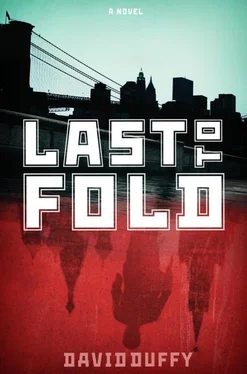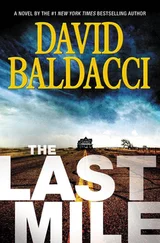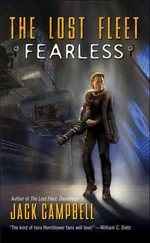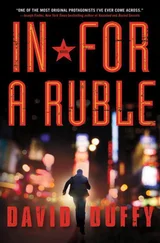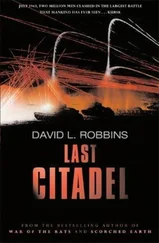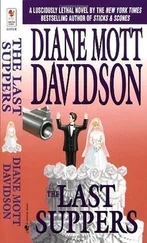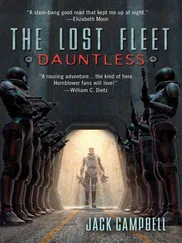None of this was as unusual as it sounds. Naftaly Frenkel, a Stalin favorite who oversaw construction of the White Sea Canal, rose from prisoner to camp commander. The deputy director of the Dmitlag camp, a guy named Barabanov, was arrested in 1935 for drunkenness and escaped the Great Terror because he was already in jail. He emerged some years later, went back to work for the NKVD, and rose through the ranks until, in 1954, he was deputy director of the entire Gulag.
How my parents reconnected in Kolyma in 1952 is another mystery I’m trying to solve. Maybe they didn’t—there are other, less savory explanations for how I came into being—but I’ve been told by three women who knew her that he came to Kolyma that year and they were reunited, however briefly. I also know they wrote each other constantly and a few letters got through. I also know because when I was born, she named me after him. Thanks, Mom.
When Stalin finally died, everybody owned up, at least for a time, to what a disastrous experiment the Gulag had been. Beria made a play for the premiership, but Khrushchev, Molotov, and others on the Politburo stopped that. He was arrested and shot later in 1953, but in one of his last acts, he began emptying the camps. His first amnesty, declared only a few weeks after Stalin’s death, included prisoners with less than five-year sentences, pregnant women, women with children, and prisoners under age eighteen. We totaled more than one million people.
It was one thing to be released, another to get home, especially when home was five thousand frozen miles away. Kolyma is a thousand miles north of Vladivostok, a region that the words frigid, barren, and isolated do not begin to describe. I’ve been back as an adult, and I cannot believe that anyone survived there. It’s said that the permafrost still gives up an occasional corpse, even today.
The only transport was Gulag stolypinski , rail cars refitted for prisoners, which meant gutted to hold as many zeks as could be squeezed in. My mother didn’t make it. This is the irony that breaks my heart whenever I think about it. She spent all but a few years of her adult life in concentration camps, somehow keeping starvation, disease, rape, and worse at bay, but she was too weak to make the final journey home. Pneumonia took her somewhere in the Urals.
I flipped through the pages in Sasha’s file. Letters, in her hand, stretching from 1937 to 1953, including her two terms in the Gulag, 1937–46 and 1948–53. They were what I’d been planning to go to Moscow to pick up before the Mulhollands intervened. “Your mother had a cousin who kept every letter she received from her,” Sasha e-mailed me. “22! A stroke of luck—I found them in the cousin’s file.” That Sasha had discovered them was miraculous, but no more so than her finding the means to write in the first place—or that the letters had reached their recipient. Prisoners went to great lengths to record life in the camps and to communicate with those outside, and written records do remain, but not that many.
I skipped though the stack of paper, looking for letters from 1952–53, the time of my birth. Somewhere, I hoped against hope, she might have mentioned my father. A note in a different hand, shaky script drawn by heavy black marker, stopped me cold.
I KEPT THIS ONE, SHIT-SUCKER. MORE TOO. THEY MAKE GOOD READING, IF YOU GIVE A SHIT ABOUT A SHIT-SUCKING ZEK. THE OUTCOME OF THIS POINTLESS STORY SURPRISED EVEN ME. YOU’LL GET A KICK OUT OF IT. IF YOU LIVE TO SEE IT.
Lachko. I thumbed through the pages. The same message had been inserted in place of a half-dozen letters. I had the feeling they all mentioned my father. Lachko had found another way of toying with me.
I turned on my computer and began the laborious process of entering dates, names, and places. I got halfway through the correspondence, but my mind kept going back to that first letter. I couldn’t shake the image of the girl and her mother in the cold new snow, watching her red-haired father being led to his execution.
I can remember each of the times in my life when I’ve cried. At fourteen, when I was sent back to the Gulag. At thirty-six, when I made the choice that would change everything. A few months later when I saw my son for the last time. Now, two-thirds of a century after the fact, I wept for three people whose suffering ceased long ago. Their fate—no different from that of millions of others—made me wonder whether God should have locked the gates to the Garden of Eden when he had the chance and put an end to his experiment with humanity there and then.
I fell asleep, as I often do on such nights, a hollow feeling in my soul, pondering the unanswerable, while the pillows soaked up my tears.
The Chekist leaned back and closed his eyes. He didn’t need the transferred tape to remember what happened next. It was imprinted on his memory, as permanent and precise as any digital code.
Snow falling heavily as he drove through the birch forest. Three or four inches already on the dirt road. He could see an earlier set of tire tracks, covered by an inch at least. Telling his driver to stop, he knelt in the snow, brushing away the newly fallen flakes with his gloved hand. Outbound tread. Someone had left since he started here ninety minutes ago. Was he too late?
He told the driver to move on. He’d chosen the man just for this job. He knew what to do when they got there.
The headlights of the limousine swept the buildings in the clearing—caretaker’s cottage, barn, main house—illuminating their silhouettes in the snowfall. Two Mercedeses parked on the side. He recognized them as Gorbenko’s and Kosokov’s. Polina’s BMW was nowhere in sight. Hers was the tread on the road.
A rectangle of light framed the caretaker as he came out his door, waving in greeting and bending forward, sludging through the wind. The driver leaned across the roof of the car, waiting until the man came close. The caretaker fell backward as the driver shot him, the crack of his pistol muffled by the snow. The driver was halfway to the door of the cottage before the man hit the ground.
The front door to the house was unlocked. The Chekist didn’t stop to shake the snow from his suit but turned left toward the study. That’s where he’d be. That’s where he was, pulling files from a desk drawer.
“I warned you, Anatoly Andreivich,” he said.
“Whaaaa!” Kosokov dropped a pile of papers and turned.
“Who were you expecting?”
“I… I…”
“The Cheka knows. The Cheka always knows. Where’s Gorbenko?”
“He… I…”
The Chekist hit Kosokov in the side of the face with his automatic. Blood spurted from the banker’s nose. “Where’s Gorbenko?”
“He’s… dead.”
“Dead? How?”
“Polina…”
That didn’t surprise him. Chivalrous to the last. “God knows what she ever saw in you,” the Chekist said. “Just a small greedy coward. Where is she?”
“Not here.”
“I can see that, you fool. Where?” He raised his gun hand to swing at the banker again.
“Stop! She… She went back to Moscow.”
“Coming back?”
“No.”
“Bullshit.” With one eye and the gun on Kosokov, the Chekist searched the room. The CDs Kosokov had told Polina about weren’t there. “Let’s go,” he said.
“No! I—”
The Chekist hit him again. “Show me Gorbenko.” He pushed him to the door and grabbed the half-full vodka bottle on the way out.
The driver was waiting. The Chekist told him to search the house and put the banker’s computer and files in the car. Then he followed Kosokov to the barn. The lights were on. The Chekist felt more than saw movement from the right, near a row of horse stalls. When he turned there was nothing there. Probably just a rat. Kosokov led him across the big empty floor to a trapdoor in the back. Cement stairs led down into the hole. An old bomb shelter. The Chekist shone his flashlight through the hatch. The beam caught Gorbenko’s lifeless eyes staring up at him from eight feet below. A perfectly serviceable grave.
Читать дальше
